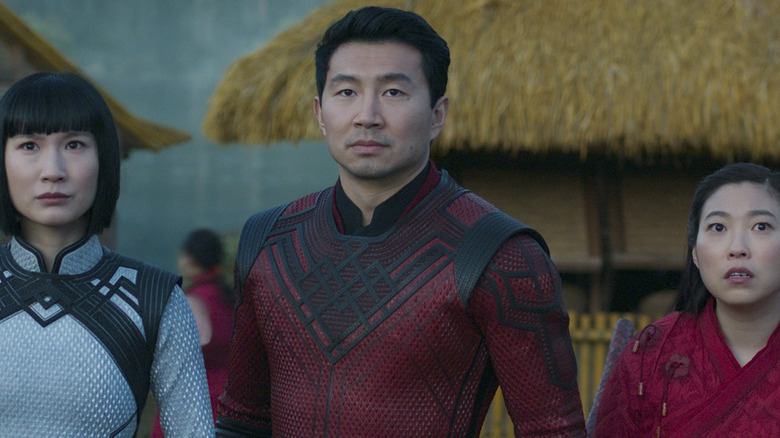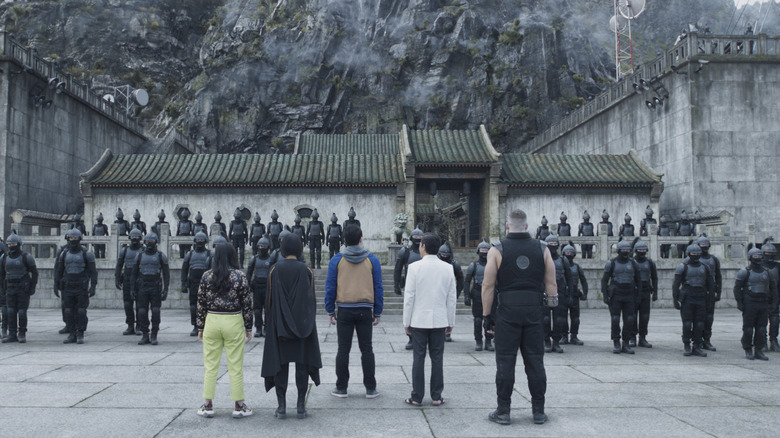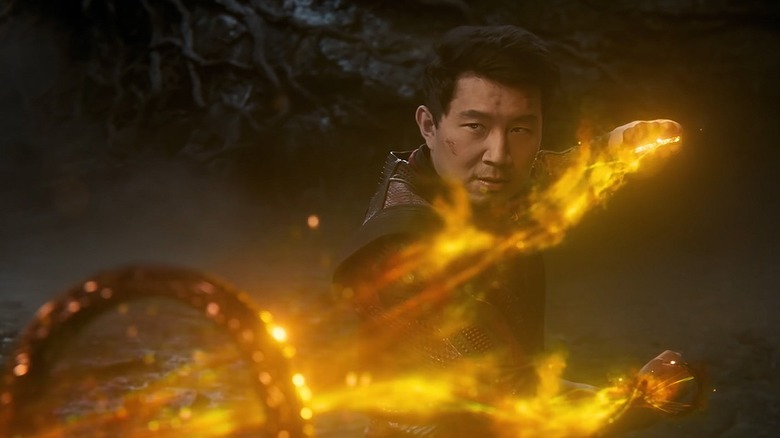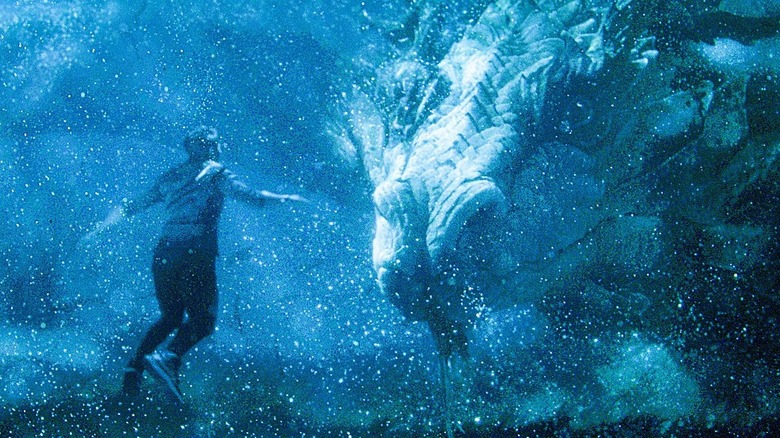Shang-Chi Ending Explained: Keeping Track Of Character Amid Chaos
Another installment in the ever-growing Marvel Cinematic Universe means another round of breakdowns, speculation, and breathless "Ending explained!" posts to keep you occupied (or annoyed?) for the foreseeable future. Yet fear not, dear reader, because this "Shang-Chi and the Legend of the Ten Rings" article will most assuredly not be a typical plot summary that merely regurgitates everything you already know. There'll be some rundown of the story here, but only in the pursuit of contextualizing the third act and all the ways that it plays out, both the good and the bad. Have you seen "Shang-Chi" already and feel ready to dig into that fantastical ending? Let's do this.
Full, exhaustive, and major spoilers for "Shang-Chi and the Legend of the Ten Rings" follow. Don't say I didn't warn you!
The Legend of Shang-Chi (and Wenwu)
It may have been a bit of a surprise to comic fans when Marvel picked Shang-Chi, of all characters, to headline the franchise's first Asian-American superhero movie and an even bigger one when writer/director Destin Daniel Cretton ("Short Term 12," "The Glass Castle," "Just Mercy") was tasked with bringing the film to life. But rather than kick off the action with Shang-Chi, the film first gives us a tour through the centuries with Wenwu (Tony Leung) and the backstory that makes up the eponymous legend of his magical Ten Rings. Honestly, the story of a warmongering conqueror becoming smitten with a warrior-princess like Ying Li (Fala Chen) is intriguing enough to make us want a movie all of their own, though it's one that ultimately ends in tragedy with Li's passing. But it's not a terribly inconvenient consolation prize to instead watch the charismatic Simu Liu alternately smirk and fight his way through any situation thrown his way, steadily becoming a legendary superhero in his own right.
Jumping ahead to the "present day" (although remember, the MCU's present day after "Avengers: Endgame" and its five-year time jump is different from ours), we quickly fall into the routine of Shang-Chi's daily life of parking cars with his best friend, Katy (Awkwafina). It doesn't take very long for the two to find themselves in trouble, but through no fault of their own. The heavily-marketed fight sequence set on a bus careening through the streets of San Francisco while fending off Ten Rings soldiers not only serves as one of the most intense and thrilling action scenes the MCU has ever produced, but it instantly throws Shang-Chi back into a wider world that he thought he'd left behind for good. Cue a flight to Macau, a reunion with his estranged sister Xialing (Meng'er Zhang) who now runs a Marvelized fight club with all manner of cameos and troublemakers (Extremis soldiers, Abomination, Wong, oh my!), the second of the film's stand-out action scenes amid a bamboo scaffolding brawl, and the untimely arrival of Wenwu himself, who is once again wielding his powerful Ten Rings and is dead-set on bringing violence and death to anyone who gets in his way.
As it turns out, Wenwu hasn't exactly taken the loss of Li very well. A heaping dose of exposition and a series of flashbacks fill in the blanks for us (though not always in the most seamless manner), bringing us up to speed on how he's become convinced that Li is calling out to him for help as a prisoner in her original village of Ta-Lo. Naturally, neither Shang-Chi nor Xialing are convinced of this madness and their rapidly-spiraling father throws them into a cell for their troubles. It's here that none other than Sir Ben Kingsley's Trevor Slattery, the actor-turned-terrorist from "Iron Man 3," makes his grand return to face the reckoning of the "real Mandarin," Wenwu himself. Armed with his adorable MacGuffin-y sidekick Morris and his amusingly inexplicable translation skills, Shang-Chi, Xialing, and Katy have just what they need to break out and find a way into the hidden city of Ta-Lo.
Their arrival narrowly precedes the incoming Wenwu and his army of Ten Rings minions, promising an epic battle of fantasy-sized proportions that gives the group of good guys scant time to acquaint themselves with their aunt Ying Nan (Michelle Yeoh), fine-tune their abilities, and for the siblings to come to terms with having to fight off their own father.
The Hits and Misses of the Shang-Chi Ending
So how well does it all come together? Well, it's complicated.
The final act sees Wenwu's obsession drive him to attack Ta-Lo and unwittingly unleash dark powers beyond his imagination. Tricked by the "Dweller-in-Darkness," who manipulated Wenwu and his passion for what he most wants in the world (to bring his love back at any cost) into freeing it from confinement in Ta-Lo, Wenwu's actions trigger the arrival of the gnarly-looking "soul-eaters" and the commencement of all-out war between the combined forces of Ta-Lo's inhabitants and the Ten Rings versus the evil forces who threaten to destroy everything. Only the unexpected appearance of the "Great Protector" at Shang-Chi's lowest moment (literally, as he's thrown deep underwater while feuding with his father), Katy's hero moment armed with a bow and arrow, and Shang-Chi himself fully embracing his mother's teachings to gain control of the Ten Rings himself manage to save the day.
Unfortunately, what's missing amid all this lore and mythology and larger-than-life heroics is any real insight on Shang-Chi as a character or, just as importantly, the dynamic between Shang-Chi and his father Wenwu. Without these key pieces of emotional grounding, so much of the third act can't help but fall flat. This tends to be a recurring problem with Marvel movies, but it feels particularly disappointing here when the elements at play feel so refreshingly varied and unique from the less-fantastical settings of prior entries in the MCU. Cretton seems to realize this as well, to his credit, which perhaps explains the seemingly last-minute addition of Shang-Chi on the eve of battle wrestling with killing his father. "A blood debt must be paid in blood," as Wenwu once told his much-younger son after committing a frightening act of violence in front of him on his quest for revenge against Li's killers. Shang-Chi echoes these ominous words from his memory as he sets his sights on his father, but it can't help but fall flat when this flashback was only just revealed to us, and Shang-Chi has never shown any real tendency to resort to killing. It's a glaring false note that undercuts much of his following actions, including the final duel with Wenwu.
It doesn't help matters much that this issue is then promptly dropped until a stray moment in Shang-Chi's one-on-one fight against Wenwu, having disarmed him of his Rings and in a position to easily kill him. He doesn't, of course, but only because he's never shown any previous signs that he'd be capable of such an act in the first place. It's a meaningless gesture under the impression that it's a grand resolution to his arc.
A Final Battle for the Soul
But on its own, importantly, the final act is not dysfunctional in the least. I mean it as a compliment when I say it's probably one of Marvel's nastiest final battles that we've seen in quite some time, with the creature designs for Ta-Lo's native animals and especially the insidious soul-eaters demanding tons of credit. The heightened stakes and clearly-established action call to mind sequences straight out of "The Chronicles of Narnia" (that one exciting battle at the end of the first movie, at least!) rather than simply retreading previous Marvel entries. This is also where we see the resolution of Katy's arc, where she goes from an aimless drifter content to fritter away her ambition to someone motivated enough to live her life with passion for what truly interests her. Incredibly, this sense of purpose comes to her after what's essentially a hilariously inelegant "You miss 100% of the shots you don't take" pep-talk, and I also mean that as a compliment.
The main thrust of the battle that involves Wenwu breaking down the gate that holds back the most evil forces in the "Shang-Chi" universe is a stunning, fantasy-fueled conflict the likes we've never seen in the MCU before. The fact that it doesn't quite embrace the spiritual and allegorical worldviews that much of the film had been hinting at (the recurring dragon motif could've been more effective if left abstract and dreamlike, instead of involving a literal "Great Protector" who seemingly exists only to be another winged creature big enough to fight the other winged creature, no?) hardly negates the tragic redemption of Wenwu giving up control of the Ten Rings for good and making peace with his son in their final duel.
Ultimately, the ending of "Shang-Chi and the Legend of the Ten Rings" — and especially its post-credit scenes — neatly position its main protagonist as a superhero fit to join the ranks of the Avengers proper, all while delivering an entertaining-enough origin story to get him to that point. Is that enough? For many, it will be and that's perfectly fine. But for others, the missed opportunities that hold back much of the first two-thirds can't help but drag down the ending along with it.



